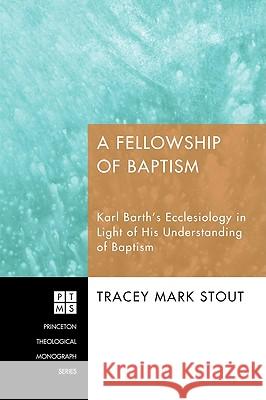A Fellowship of Baptism: Karl Barth's Ecclesiology in Light of His Understanding of Baptism » książka
A Fellowship of Baptism: Karl Barth's Ecclesiology in Light of His Understanding of Baptism
ISBN-13: 9781606089958 / Angielski / Miękka / 2010 / 208 str.
A Fellowship of Baptism: Karl Barth's Ecclesiology in Light of His Understanding of Baptism
ISBN-13: 9781606089958 / Angielski / Miękka / 2010 / 208 str.
(netto: 118,88 VAT: 5%)
Najniższa cena z 30 dni: 124,14 zł
ok. 16-18 dni roboczych
Bez gwarancji dostawy przed świętami
Darmowa dostawa!
Description: A Fellowship of Baptism is a critical rereading of Karl Barth's ecclesiology, arguing that reading his ecclesiology through the lens of his mature view of baptism best enables one to understand Barth's view of the church. Barth's insistence on believer's baptism is connected to the free-church ecclesiology he develops in the Church Dogmatics. The church, for Barth, is a gathered, concrete community formed by the Holy Spirit. The result of believer's baptism should be a community that is free from cultural and political control so that it can serve the world and witness to it. At the same time, questions are raised about Barth's rejection of the sacramental nature of baptism and the implications this has for ecclesiology. The strengths of believer's baptism and the weakness of his non-sacramental view are both seen in his writings on the church and are brought into conversation with one another. Reading Barth's ecclesiology and doctrine of baptism together helps to show the interdependence of baptism and ecclesiology in Barth as well as in all church teaching and practice. Endorsements: ""Considering Barth's view of Baptism, Tracey Stout helpfully demonstrates how and why Baptism, Ecclesiology, Christology, Pneumatology, and Ethics are all intimately connected. Stout judiciously maintains that, despite Barth's later tendency to separate the church's sacramental actions from the action of the Holy Spirit, we can still learn from Barth how and why it is important to understand that divine action enables free human action and thus encourages Christians to develop an appropriate Ecclesiology, Ethics, and Political Theology. This book serves its subject well and deserves to be widely read."" --Paul D. Molnar Professor of Systematic Theology St. John's University, New York ""Even the most vigorous of Karl Barth enthusiasts often remain perplexed at his late turn concerning baptism, as he rejected infant baptism in favor of believers' baptism. In this masterly study of Barth on baptism, Tracey Stout demonstrates that Barth's drastic shift was not made in opposition to Christian sacramentalism so much as for the sake of Christian freedom, most especially for the liberty of the church. For Barth, it is only when the entire Body of Christ makes its intentional witness to the world that it can become God's truly confessional community. Stout's treatment of this crucial matter will thus garner the interest of students and professors, of pastors and laypeople alike."" --Ralph C. Wood University Professor of Theology and Literature Baylor University About the Contributor(s): Tracey Mark Stout is Associate Professor of Christian Studies at Bluefield College in Bluefield, Virginia.
Description:A Fellowship of Baptism is a critical rereading of Karl Barths ecclesiology, arguing that reading his ecclesiology through the lens of his mature view of baptism best enables one to understand Barths view of the church. Barths insistence on believers baptism is connected to the free-church ecclesiology he develops in the Church Dogmatics. The church, for Barth, is a gathered, concrete community formed by the Holy Spirit. The result of believers baptism should be a community that is free from cultural and political control so that it can serve the world and witness to it. At the same time, questions are raised about Barths rejection of the sacramental nature of baptism and the implications this has for ecclesiology. The strengths of believers baptism and the weakness of his non-sacramental view are both seen in his writings on the church and are brought into conversation with one another. Reading Barths ecclesiology and doctrine of baptism together helps to show the interdependence of baptism and ecclesiology in Barth as well as in all church teaching and practice.Endorsements:""Considering Barths view of Baptism, Tracey Stout helpfully demonstrates how and why Baptism, Ecclesiology, Christology, Pneumatology, and Ethics are all intimately connected. Stout judiciously maintains that, despite Barths later tendency to separate the churchs sacramental actions from the action of the Holy Spirit, we can still learn from Barth how and why it is important to understand that divine action enables free human action and thus encourages Christians to develop an appropriate Ecclesiology, Ethics, and Political Theology. This book serves its subject well and deserves to be widely read.""--Paul D. MolnarProfessor of Systematic TheologySt. Johns University, New York""Even the most vigorous of Karl Barth enthusiasts often remain perplexed at his late turn concerning baptism, as he rejected infant baptism in favor of believers baptism. In this masterly study of Barth on baptism, Tracey Stout demonstrates that Barths drastic shift was not made in opposition to Christian sacramentalism so much as for the sake of Christian freedom, most especially for the liberty of the church. For Barth, it is only when the entire Body of Christ makes its intentional witness to the world that it can become Gods truly confessional community. Stouts treatment of this crucial matter will thus garner the interest of students and professors, of pastors and laypeople alike.""--Ralph C. WoodUniversity Professor of Theology and LiteratureBaylor UniversityAbout the Contributor(s):Tracey Mark Stout is Associate Professor of Christian Studies at Bluefield College in Bluefield, Virginia.











